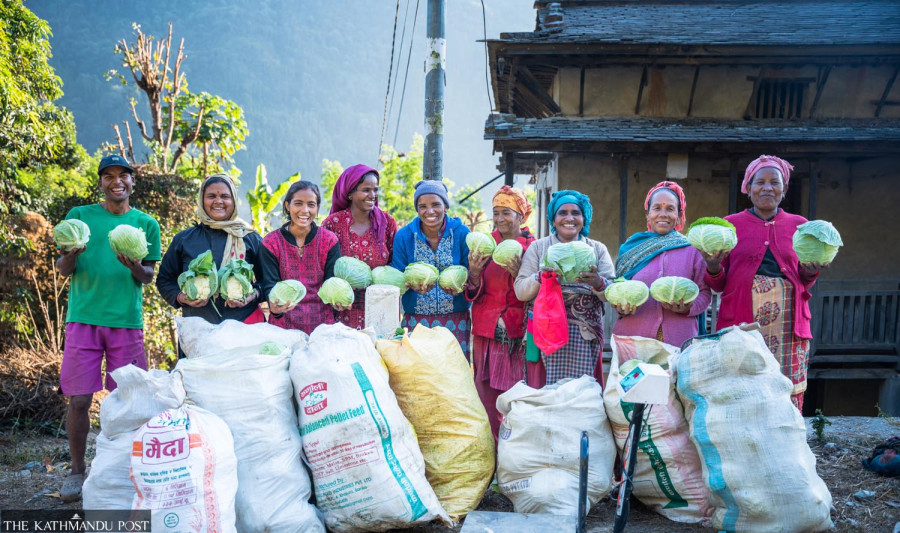Money
Kalegaun: A thriving hub for vegetable farming
The village has favourable climatic conditions, fertile soil, year-round irrigation, and accessibility, making it an ideal location for vegetable farming.
Mahesh KC
Kalegaun, a village slightly east of the Jajarkot district headquarters, is not only a fertile land with hundreds of farmers engaged in agricultural production but also an emerging hub for commercial vegetable farming.
Sadhana Pun, a farmer from Kalegaun in Bheri municipality, starts her day early in the morning.
She begins with managing livestock and cleaning her home. Amidst her household chores, she heads to the field and brings back a sack of cabbage.
"The cabbage will be supplied to Surkhet. A vehicle is coming to pick it up, so I prepared it in advance," said Pun. She gathered three sacks of cabbage and began packing them.
A while later, a vehicle arrived, and all the farmers brought their sacks near it. The produce was weighed, and the farmers received their payments accordingly.
With the winter vegetable season in full swing, many farmers like Pun are busy harvesting and sending their produce to the market.
Pun, who owns eight ropanis of land, earns up to Rs300,000 annually selling seasonal and off-season vegetables.
After covering household expenses and her children's education, she saved around Rs200,000.
Sabin KC, another farmer in Kalegaun, worked in Malaysia as a migrant labourer for six years before returning to his hometown two years ago.
Upon his return, he started vegetable farming. On nine ropanis of land, he grows cabbage, cauliflower, tomatoes, radishes, and carrots during winter and adjusts his crop selection according to the season.
KC earns approximately Rs400,000 annually and has decided not to return abroad for work.
Instead, he plans to expand his farming business by leasing additional land. "I am planning to increase production and double my yield this year," he shared.
Situated at 720 metres above sea level and near the Bheri river, Kalegaun enjoys favourable climatic conditions, fertile soil, year-round irrigation, and accessibility, making it an ideal location for vegetable farming.
"This place is suitable for growing both seasonal and off-season vegetables," said Damber Regmi, a local farmer. "Irrigation is available throughout the year, and the soil is highly fertile."
Vegetables grown in the village are supplied to the district headquarters, Khalanga, and neighbouring districts such as Rukum West, Dolpa, Salyan, and Surkhet.
"The demand for vegetables is increasing day by day. There is no issue in finding a market since the produce is sold directly from the fields," said Sabina Basnet, another farmer.
According to Basnet, traders purchase cabbage at Rs40 per kg, cauliflower at Rs70 per kg, and tomatoes at Rs80 per kg. "Vegetable farming not only ensures fresh produce for our consumption but also provides a steady income," she added.
Among the nearly 200 households in Kalegaun, 70 percent are into commercial farming.
Various agricultural projects are being introduced to encourage more people to join the sector. However, a significant challenge remains—the younger generation is reluctant to take up farming.
"We have continued farming, but our children, citing various reasons, are unwilling to adopt this profession," said Purna Kumari Thapa, a local farmer. "Agricultural production needs better management and modernisation to attract the younger generation."
Farmers also emphasise the need for government support regarding fertilisers, seeds, and financial assistance.
"Even a small investment from the government and non-governmental organisations can promote agriculture and encourage farmers," said Pun. "We need modern agricultural tools, knowledge, and regular skill development training. The government must address these needs."
Kalegaun, located just 5 km from the district headquarters, Khalanga, is vital to agricultural production. Deepak Rana, chairman of Bheri Municipality, acknowledged its significance and expressed plans for further development.
"We are working towards making Kalegaun a hub for agricultural production. Discussions are ongoing within the executive body, and we plan to move forward with a concrete strategy soon," said Rana.




 10.12°C Kathmandu
10.12°C Kathmandu














